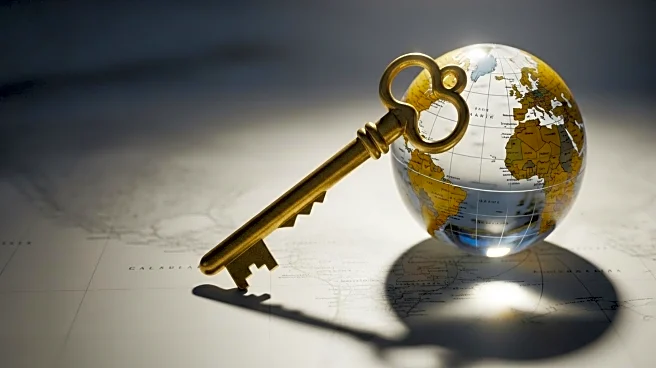What's Happening?
President Trump has announced a historic peace agreement in Gaza, which he claims could be his 'greatest deal' yet. The agreement, signed in Sharm el-Sheikh, Egypt, involves the release of 20 Israeli hostages by Hamas in exchange for a prisoner release and troop pullback by Israel. The event was attended by leaders from various countries, including France, the UK, Germany, Italy, Canada, Turkey, Qatar, Pakistan, Indonesia, Jordan, and Egypt. Trump emphasized the potential for permanent peace in the region, which has been plagued by conflict for 3,000 years. The agreement includes a 20-point peace plan, with Egyptian President Abdel Fattah el-Sisi, Qatari Emir Tamim ibn Hamad Al Thani, and Turkish President Recep Tayyip Erdogan signing as guarantors.
Why It's Important?
The Gaza peace agreement marks a significant diplomatic achievement, potentially ending decades of conflict in the region. It could lead to improved relations between Israel and Muslim-majority countries, fostering stability and economic growth. The agreement may also enhance President Trump's legacy as a peacemaker, influencing U.S. foreign policy and international relations. The involvement of multiple nations in the agreement underscores its global significance, with potential ripple effects on regional politics and security dynamics.
What's Next?
The next steps involve the implementation of the 20-point peace plan and the establishment of an international peacekeeping force in Gaza. The transitional government in Gaza will be supervised by a proposed Trump-chaired Board of Peace. The agreement may encourage more countries to join the Abraham Accords, further normalizing relations with Israel. The success of the peace plan could lead to broader diplomatic breakthroughs, including improved U.S.-Iran relations.
Beyond the Headlines
The Gaza peace agreement could redefine the geopolitical landscape in the Middle East, shifting focus from conflict to cooperation. It may challenge traditional narratives and power structures, promoting a new era of diplomacy. The agreement also highlights the role of international collaboration in resolving long-standing disputes, setting a precedent for future peace efforts.









